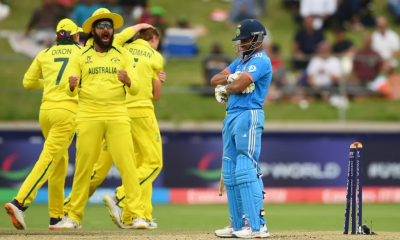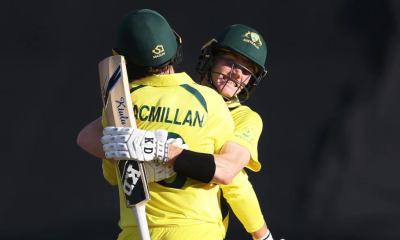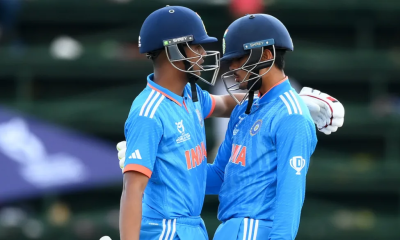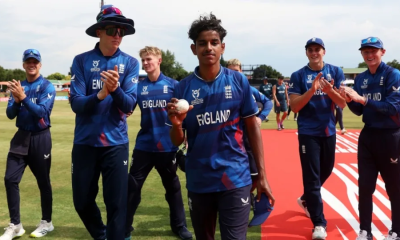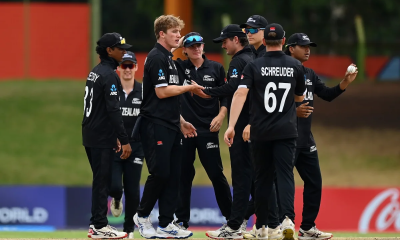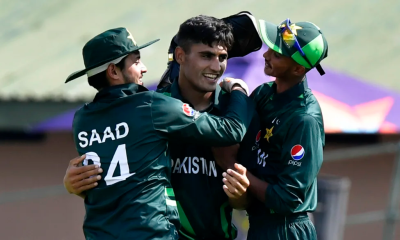Latest News
Nepal beat Afghanistan in thriller; West Indies inch past England by two wickets
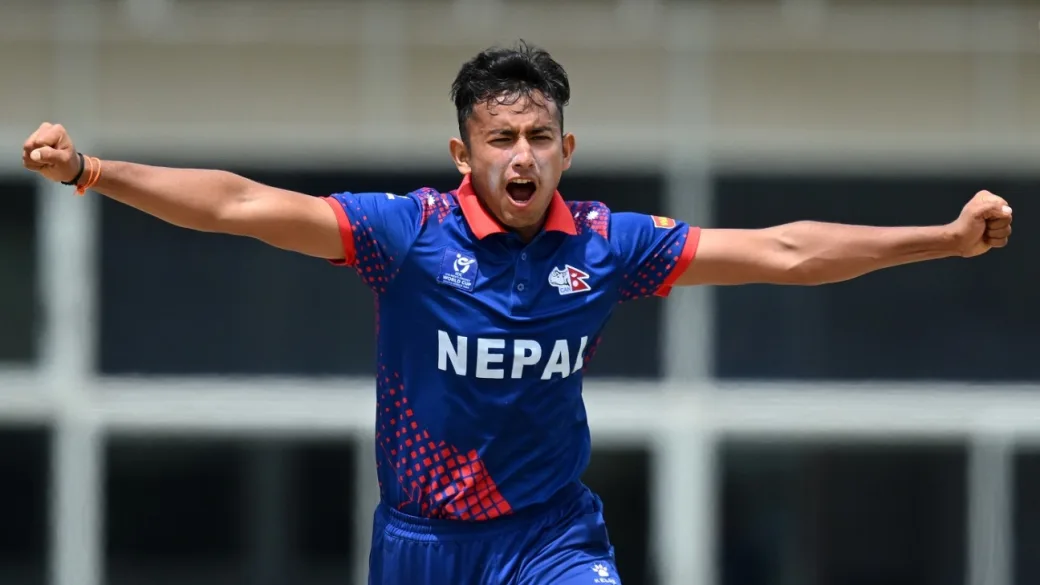
Afghanistan and Nepal had everything to play for in East London on Friday, and play they did, toe-to-toe, inch-for-inch, all the way to a thrilling finish amid gripping drama. Nepal won by one wicket in the end, and entered the Super Six stage of the men’s Under-19 World Cup at the expense of Afghanistan; but the game was, perhaps, more than just the result and the make-up of the next stage of the tournament.
Nepal seemed to have it in the bag at various stages, when first Aakash Chand was running through the Afghanistan batting, and then when Dev Khanal, the captain, was stroking his way to an 89-ball 58. But if there’s one thing Afghanistan don’t do – at any level of the game – it’s to give up. They took it deep, before Subash Bhandari, who had earlier returned 1 for 15 from 8.1 overs, poked at one outside off to the legspin of Arab Gul, got a healthy edge and sent it through a packed off-side field for four. Deal done. The celebrations were as wild as the game itself was.
The win was set up by Chand, later named Player of the Match. By the tenth over, Afghanistan were tottering at 34 for 5 after having opted to bat. Chand had four of those wickets. The fightback came courtesy Hassan Eisakhil (20) and Naseer Khan Maroofkhil (31), and then Allah Mohammad Ghazanfar (37); but all Afghanistan could put up was 145. Chand finished with 5 for 34, his fifth wicket that of Eisakhil.
Nepal’s reply started almost as shakily, with Khalil Ahmed and Faridoon Dawoodzai reducing them to 24 for 3. But a dominant Khanal and a sedate Aakash Tripathi appeared to take the game away from Afghanistan with a 49-run stand, the best of the innings.
A twist had to come, and it came in the form of Maroofkhil sending Tripathi back in the 24th over, with the target still 73 runs away. Khanal wasn’t going anywhere, though, even as a couple more wickets fell at the other end, before being felled by Ghazanfar for 58.
The total then was 127 for 7. Overs were not an issue, but Afghanistan were into Nepal’s tail. Dipak Bohora ensured it wagged enough to take Nepal to within a shot of victory, but he too fell with six runs still to get. The fielders were all around the bat at that stage, and the dot balls piled up; but somehow, in the end, Bhandari found a way out.
Brief scores:
Nepal Under 19s 149 for 9 in 44.4 overs (Dev Khanal 58, Dipak Bohara 27; Faridoon Dawoodzai 3-21, Khalil Ahmed 2-31, Naseer Khan Maroofkhil 2-28) beatAfghanistan Under 19s 145 in 40.1 overs (Hassan Eisakhil 20, Naseer Khan Maroofkhil 31, A M Ghazanfar 37, Faridoon Dawoodzai 29; Akash Chand 5-34, Dipesh Kandel 2-17) by one wicket
Nathan Edward’s all-round performance helped West Indies beat England by two wickets in Potchefstroom and qualify for the Super Six round. He picked up 3 for 28 with his left-arm seam as England folded for 192, and then scored an unbeaten 49 to take his side home.
After West Indies opted to bowl, Nathan Edward castled Jaydn Denly in the first over of the match. England captain Ben McKinney and Noah Thain added 50 for the second wicket, before he sent McKinney back. Thain and Hamza Shaikh, who scored 54 off 83, took England to 97 for 2 in the 21st over, but once offspinner Tarrique Edward removed Thain, the innings collapsed. At one stage, England were 146 for 7, but the lower order dragged them close to 200.
West Indies, too, lost a wicket in the first over, and were 31 for 2 in the sixth. But their captain Stephan Pascal absorbed all the pressure and scored 58 off 84.
Legspinner Tazeem Chaudry Ali tried to keep England in the contest with his three wickets, including that of Pascal. When West Indies lost their seventh, the target was still 37 runs away, though the asking rate was never a concern. But Nathan Edward stood up once again with an unbeaten 49 off 80 balls. He added 36 off 32 deliveries with Tarrique Edward, in which the latter’s contribution was 5, before hitting the winning boundary.
Brief scores :
West Indies Under 19s 196 for 8 in 41 overs (Stephan Pascal 58, Nathan Edward 49*, Jordan Johnson 31; Farhan Ahmed 2-33, Tazeem Chaudry Ali 3-34) beat England Under 19s 192 in 46.3 overs (Ben McKinney 26, Hamza Shaikh 54, Noah Thain 40; Nathan Edward 3-28, Isai Thorne 2-40, Raneico Smith 2-28, Taarque Edwards 2-40) by two wickets
Ariful Islam’s 103, followed by a four fer by Mahfuzur Rahmaqn Rabby helped Bangladesh thump USA by 121 runs in Bloemfontein. With two wins in three matches, Bangladesh finished second in their group, and advanced to the Super Six stage of the tournament.
USA had Bangladesh at 94 for 3 after opting to bowl first, but a 122-run fourth-wicket stand between Ariful and Ahrar Amin, who scored 44, took Bangladesh to 291. Ariful notched up nine boundaries, and kept the scoring rate healthy. But left-arm seamer Arya Garg continued his fine form for USA, taking 3 for 68 to finish the competition with five wickets.
USA started the chase steadily, with opener Prannay Chettipalayam scoring 57. But he didn’t find much support from the other end, as USA lost track towards the halfway mark. What was 86 for 1 became 112 for 4, while from the 40th over onwards, they lost 6 for 16 to get bowled out for 170. Left-arm spinner Rabby was the star of the Bangladesh bowling attack, as he got 4 for 31 from ten overs.
Brief scores:
Latest News
Zelensky to meet Trump in Washington to sign minerals deal

Ukrainian President Volodymyr Zelensky will meet US President Donald Trump in Washington on Friday to sign an agreement on sharing his country’s mineral resources, Trump has said.
Zelensky has described the bilateral deal as preliminary, and said he wants further agreements which include US security guarantees to deter renewed Russian aggression.
But Trump said the US would not provide guarantees “beyond… very much”, saying the responsibility should instead fall to Europe.
Trump also seemingly ruled out the prospect of Ukraine becoming a Nato member – one of Zelensky’s long-held ambitions.
Speaking at a meeting of his cabinet on Wednesday, Trump said the presence of American workers extracting rare earth metals on Ukrainian soil would provide “automatic security” for Ukraine.
He said Kyiv should “forget about” joining Nato and repeated Russia’s claims that the issue was one of the driving factors behind the war.
The US president suggested a ceasefire between Ukraine and Russia was not far off, telling reporters: “We’re going to make a deal with Russia and Ukraine to stop killing people.”
But Zelensky said without security guarantees “we won’t have a ceasefire, nothing will work, nothing”.
“I want to find a Nato path or something similar,” he said.
Russia has consistently opposed the idea of Ukraine becoming a member, fearing it would bring Nato forces too close to its borders.
In 2008, the alliance had said that Ukraine could eventually join.
Zelensky said the success of the minerals deal, which was formally backed by his government on Wednesday evening, would depend on the outcome of his meeting with Trump this week.
Key details have not yet been made public, but Ukrainian Prime Minister Denys Shmyhal said it envisages an “investment fund” for Ukraine’s reconstruction.
The prospect of a deal was first proposed by Zelensky last year as a way to offer the US a tangible reason to continue supporting Ukraine.
But disagreements over its substance exacerbated tensions between Trump and Zelensky in recent weeks.
The Ukrainian president had rejected an initial request from the US for $500bn (£395bn) in mineral wealth, but media reports suggest this demand has now been dropped.
There are also differences in how both sides are now describing the deal. Trump has lauded the “very big agreement” as an opportunity for the US to get its “money back” after funding aid to Ukraine.
But Zelensky has instead referred to it as a “framework agreement” upon which he hopes further deals can be made.
Trump has said he wants a quick end to the war in Ukraine and has sought to reset relations with Russia. After a phone call with Russian President Vladimir Putin, the two leaders sent delegations to Saudi Arabia in bilateral talks which excluded Ukraine.
In response, Zelensky accused the US of helping Putin “break out of years of isolation” and Trump of living in a “Russian disinformation space”.
Ukraine is a country rich in natural resources. Kyiv estimates that about 5% of the world’s “critical raw materials” are there. But accessing some of these resources will not be completely straightforward.
Some of the mineral deposits have been seized by Russia. According to Yulia Svyrydenko, Ukraine’s economy minister, resources worth $350bn (£277bn) remain in occupied territories today.
There are warnings too that Ukraine first needs to addresses its problem with unexploded mines before striking a deal with the US.
A quarter of Ukraine’s landmass is estimated to be contaminated with landmines, mainly concentrated in the war-torn east of the country.
UK Prime Minister Sir Keir Starmer will also be meeting both Trump and Zelensky separately this week to discuss the war in Ukraine.
He was due to arrive in Washington on Wednesday.
[BBC]
Latest News
All-round Sciver-Brunt and bowlers give Mumbai third straight win
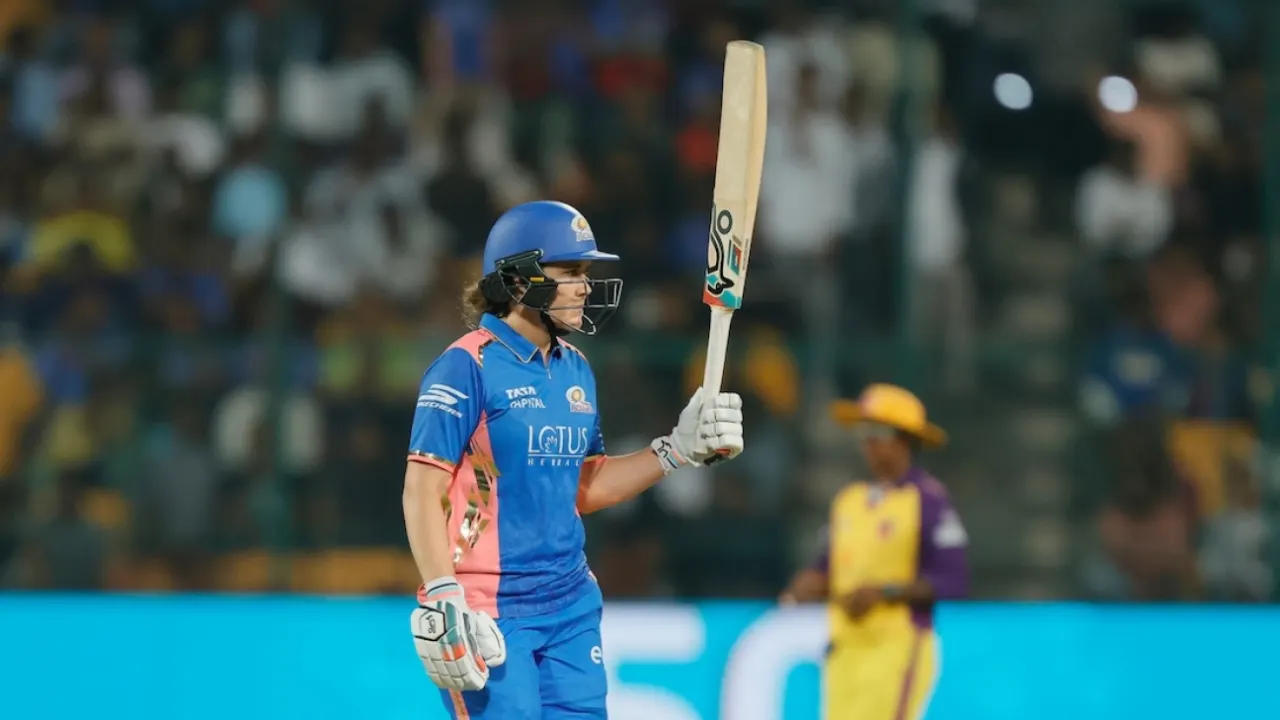
Nat Sciver Brunt put on an exceptional all-round show to propel Mumbai Indians to top of the table with an eight-wicket win over UP Warriorz in Bengaluru. She took three wickets and followed it up with an impressive and unbeaten 75 off 44 balls to chase down the target of 143 with 18 balls remaining.
Warriorz initially rode on the efforts of Grace Harris’ quickfire 45 and Vrinda Dinesh’s solid 33 but lost eight wickets for 54 runs to eventually end up with a below-par total.
Sciver-Brunt and Hayley Matthews stitched together a solid 133-run stand for the second wicket and made the chase look easy. Though Matthews struggled her way to a 50-ball 59 after getting a life early on, Sciver-Brunt’s boundary-laden knock made sure MI raced to their third win in four attempts. Warriorz are fourth on the points table now with two wins after five games.
With 252 runs from four matches, Sciver-Brunt is now the leading run scorer of this WPL, overtaking Ellyse Perry’s 235.
She came in early when MI were 6 for 1 in the fourth over, with Matthews struggling to get her timing and rhythm back. Chinelle Henry was swinging the ball both ways, making it difficult to score off in the powerplay. But Sciver-Brunt took only five balls to prove that wrong.
She welcomed Saima Thakor with a hat-trick of fours in the sixth over by sending the ball to long-on, deep square leg and deep cover. She played deep in the crease, put her bottom hand to good use and effortlessly maneuvered the ball to both sides of the pitch.
When there was width on offer, she cut fiercely, and when the length was short, she pulled behind and in front of square and toyed with the Warriorz bowlers. She brought up her fifty off 29 balls with nine fours and brought the equation down to 54 off 47 balls. This included a hat-trick of fours off Henry as well, in the 11th over.
From there, it was cakewalk for MI as Matthews also found her feet and started hitting boundaries. Overall, Sciver-Brunt struck 13 fours in her 44-ball stay.
After four matches, Warriorz took a cue from the WBBL and the Hundred and promoted Harris to open for the first time in WPL after her struggles in the middle order. The move felt just right as she looked in her element from the start.
With Navgire falling in the first over, it was up to Harris and Vrinda to steady the innings on a pitch that was holding up a bit, and the duo shared 79 runs off 52 balls to give Warriorz a solid start.
Harris began with a scoop against Sciver-Brunt and punished Shabnim Ismail for three fours on the bounce in the second over. She kep attacking and smashed 6, 4, 4, 6 off Matthews in the fourth. She swept and pulled towards square leg, muscled the ball to long-on, and rolled her wrists to bisect the gap between mid-on and midwicket.
On the other hand, Vrinda – who had scored only 40 in the previous four matches – looked in much better touch and played second fiddle to Harris. She played a lofted cover drive elegantly to start the third over and followed it with a hook in the same over. Unlike Harris, Vrinda found boundaries on the off side with classy cover drives in her 30-ball 33.
The first two partnerships gave Warriorz 81, the most for them in this WPL so far.
It was something the Warriorz captain Deepti Sharma had admitted recently, that they needed to do better in the middle overs. But they couldn’t as Warriorz squandered a strong start by losing wickets in heaps, again, to lose the plot. From 81 for 1, they collapsed to 123 for 7, losing five of those wickets in the middle overs for 30 runs.
It began when Amelia Kerr removed Harris in the 10th over after the batter was dropped on 44 by Ismail off Jintimani Kalita in the previous over. Offspinner Sanskriti Gupta then bowled a momentum-changing 11th over when she dismissed both Vrinda and Tahlia McGrath in the space of four balls. Warriorz slowed down and did not quite recover after that over.
Overall, they have lost the most wickets (24) in the middle overs (7 to 16) in this WPL so far and have been the slowest too (6.72) in that phase. With no individual brilliance rescuing them this time, their streak of two losses was broken.
Brief scores:
Mumbai Indians Women 143 for 2 in 17 overs (Nat Sciver-Brunt 75*, Hayley Matthews 59; Sophie Ecclestone 1-29, Deepti Sharma 1-25) beat UP Warriorz Women 142 for 9 in 20 overs (Grace Harris 45, Dinesh Vrinda 33, Shweta Sehrawat 19, Uma Chetry 13; Nat Sciver-Brunt 3-18, Shabnim Ismail 2-33, Hayley Matthews 1-38, Amelia Kerr 1-24, Sanskriti Gupta 2-11) by eight wickets
[Cricinfo]
Latest News
Zadran 177, Omarzai five-wicket haul knock England out
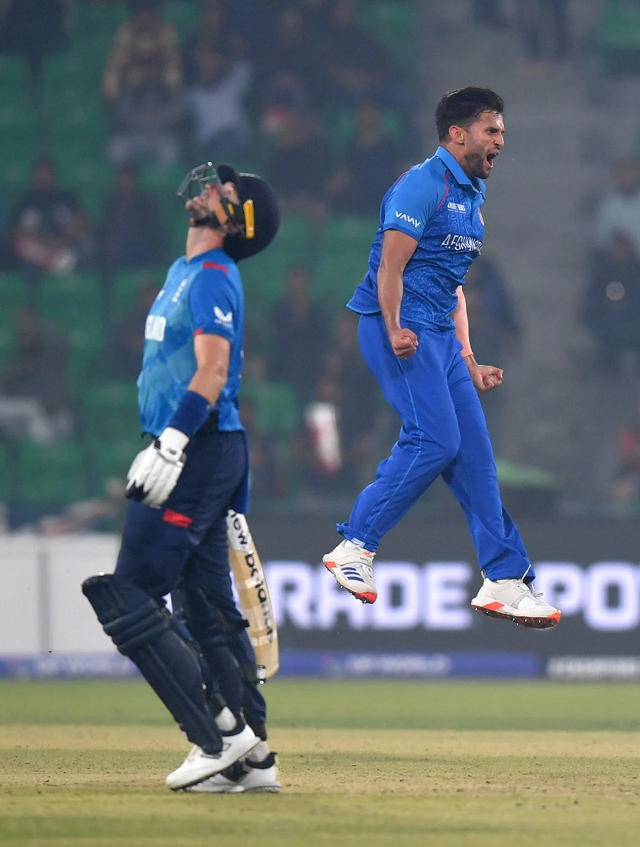
The politicians hadn’t wanted this game to go ahead, but who could have wished to deny the scenes of raw euphoria that unfolded in Lahore, as Afghanistan completed the double they had set in motion at the 2023 World Cup and dumped England out of the Champions Trophy in a wildly undulating, anxious scramble for glory.
Eight runs was the margin when – with Mark Wood hobbled and all the recognised batters gone – Adil Rashid swung for the hills off the penultimate ball of the match and picked out the man of the hour, Ibrahim Zadran, whose take in front of the dug-out was completed with the same coolness with which he had compiled his exceptional knock of 177 from 146 balls – an innings that had simply been too good to fail.
Much the same could have been said for England’s main man of their 326-run chase, Joe Root, whose 120 from 111 balls was his 17th in the ODI format but, remarkably, his first since the 2019 World Cup. Had he had a bit more support, and had he not been racked with cramp going into the final push, his run-a-ball tempo might have been more than sufficient to seize the day. Instead, he was undone by an effort ball from the indefatigable Azmatulllah Omarazi, whose five-wicket haul followed a priceless knock of 41 from 31 balls that had helped to pull his own team out of a tailspin.
Speaking straight afterwards, a shell-shocked Jos Buttler insisted he would not be making any “emotional” statements about his future as captain, but acknowledged the fundamental lack of confidence that had contributed to his team’s downfall.
After Afghanistan had opted to bat first, Jofra Archer’s three-wicket powerplay onslaught should by rights have settled the contest there and then. And yet, from 37 for 3 in the ninth over, Zadran and his captain Hashmatullah Shahidi focussed solely on survival until the point that their 103-run fourth-wicket stand had, almost imperceptibly, transformed itself into a platform for a thrillingly smooth acceleration.
Ultimately Afghanistan’s scorecard told the exact tale of their innings. Three single-figure scores at the top – for a combined total of 14 runs from 28 balls – then a trio of 40s, at ever increasing tempos, from Shahidi, Omarzai and the forty-something himself, Mohammad Nabi, whose 24-ball onslaught was a typically ageless display from a player who has been on every step of this Afghanistan journey, right from their exploratory tour of England as a de facto club side way back in 2006.
And then, underpinning it all, a performance of rare majesty from Zadran, whose sixth hundred in 35 ODI innings was not only the highest by an Afghan in the format, but the best in Champions Trophy history, trumping the 165 that Ben Duckett had posted against Australia in the previous fixture at Lahore.
It was a controlled explosion of an innings, and one of the most impressive ODI performances that can ever have been compiled. Zadran showed the tenacity to hang tough while England’s quicks were dominating the early exchanges, but after reaching his first fifty from 65 balls, he marched through to his hundred from 41 more, then clattered along at a near 200 strike-rate thereafter.
By the time he holed out to square leg at the start of the 50th over, Zadran had worked his way so smoothly through the gears that England had been left with scarcely any agency in their predicament. This was summed up when Wood, who had already spent 38 minutes off the field after his left knee gave way midway through his fourth over, was forced to leave the field once again, this time for good and with two overs of his allocation unused.
It had been a typically masochistic effort from Wood, whose willingness to bust a gut for the cause has never been in doubt. But England’s desperation to get him back into the fray there epitomised their threadbare resources. In a throwback to the sort of bit-part tactics that dominated ODI cricket in the 1980s and 1990s, Joe Root and Liam Livingstone had been charged with cobbling together 12 overs between them. But when, with nowhere else to turn, Root’s offspin was served up to the hard-swinging Nabi, two massive leg-side sixes ensued in a 23-run 47th over.
Not even Archer could stem the tide. He’d already been crashed for a six and three fours by Zadran, now in overdrive, who then launched a slower ball in Archer’s final over over long-on to seize Duckett’s record.
England’s target of 326 was daunting but not insurmountable, as they themselves had discovered on this same ground on Saturday night, when their own hefty total of 351 for 8 had been hunted down by Australia with 15 balls to spare. And yet, it was close to double the sort of target that England might at one stage had envisioned.
The scoreboard pressure was quickly brought to bear. Phil Salt started with a confident thump for four that telegraphed the trueness of the surface, but then lost his off bail as he tried to pull a skiddy length ball from Omarzai. And though Jamie Smith is undoubtedly a name for the future, it’s debatable whether he is the No.3 for the present. Certainly his dismissal was guileless in the extreme: a no-look gallop at the irrepressible Nabi, who skidded his offbreak through a touch quicker, to claim a wicket with the first ball of his spell for the third ODI in a row.
Where there was Root, there was hope, as he and Duckett set about rebuilding the innings much as they had done from an identical starting point against Australia. But after what ought to have been a costly drop from Shahidi at mid-off, when Duckett had 29, Rashid Khan stepped up with a skiddier full length, and sent his man on his way via DRS, just nine runs later.
The errors thereafter came with wearying inevitability. Harry Brook looked a million dollars for his first 20 balls, then got caught in two minds as he popped a tame return catch to Nabi for 25, whereupon Buttler – a player whose form seems so overwhelmingly dominated by his mindset – barely survived his first 12 runs before finally landing a slap for six to seemingly ignite his stay. But then, after one more slog-sweep for six off Nabi, Buttler was undone by Omarzai’s energetic lengths, as he spliced a pull straight to midwicket for 38.
Now it was all on Root. For the first 90-odd balls of his innings, England’s anchorman might as well have been on a serene stroll in Iqbal Park, with his innings scarcely deviating from a run-a-ball tempo. But then, after reaching his 50 from 50 and his hundred from 98, he felt the early onset of cramp, and with 58 still required from six overs, he inverted his stance into a Buttler-style ramp, and pinged his only six over the keeper’s head.
But it was too much to ask for Root to walk the innings home. He kept looking for the angles, and found one final sublime deflection for four through backward square, but at the precise moment at which Afghanistan’s own innings had gone into overdrive, he attempted a flick over deep third off another skidder Omarzai lifter, and was sent on his way via a scuff of the gloves to the keeper.
Jamie Overton seemed to have got the memo with the long-levered finish that he had so long promised but rarely delivered, but having brought the chase within reach with 32 from 28 balls, he attempted another takedown and found long-on with 17 still needed. And though Jofra Archer seemed to be riding his luck with an under-edge for four and a sprawling reprieve at deep cover, he was unable to close it out either. Thirteen from eight was needed when he flung his hands through an Omarzai slower ball, for Nabi in the deep to make no mistake.
Minutes later, it was all done and dusted. Afghanistan march onto what could have been another politically charged showdown with Australia, with a place in the semi-finals at stake, having already crushed the hopes of their new favourite tournament bunnies. Irrespective of the situation in their homeland, a remarkable set of players have once again epitomised the hope and escapism in tough times that only sport can provide.
Brief scores:
Afghanistan 325 for 7 in 50 overs (Ibrahim Zadran 177, Azmatullah Omarzai 41,Hashmatullah Shahidi 40, Mohammad Nabi 40; Joffra Archer 3-64, Liam Livingstone 2-28) beat England 317 in 49.5 overs (Ben Duckett 38, Harry Brook 25, Joe Root 120, Joss Buttler 38, Jamie Overton 32; Azmatullah Omarzai 5-58, Mohammad Nabi 2-57) by eight runs
[Cricinfo]
-

 Business3 days ago
Business3 days agoSri Lanka’s 1st Culinary Studio opened by The Hungryislander
-

 Sports4 days ago
Sports4 days agoHow Sri Lanka fumbled their Champions Trophy spot
-

 News6 days ago
News6 days agoKiller made three overseas calls while fleeing
-

 News5 days ago
News5 days agoSC notices Power Minister and several others over FR petition alleging govt. set to incur loss exceeding Rs 3bn due to irregular tender
-

 Features4 days ago
Features4 days agoThe Murder of a Journalist
-
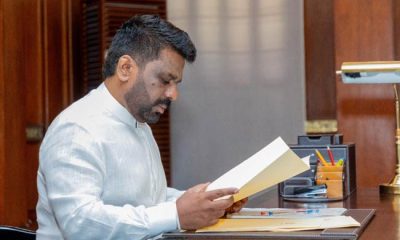
 Features4 days ago
Features4 days agoExcellent Budget by AKD, NPP Inexperience is the Government’s Enemy
-
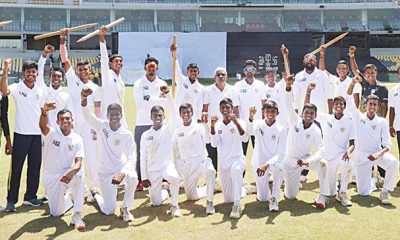
 Sports4 days ago
Sports4 days agoMahinda earn long awaited Tier ‘A’ promotion
-

 News5 days ago
News5 days agoMobile number portability to be introduced in June


